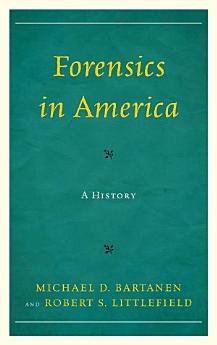Forensics in America: A History
Nov 2013 · Bloomsbury Publishing PLC
Ebook
334
Pages
reportRatings and reviews aren’t verified Learn More
About this ebook
Here is the story of the process by which competitive speech and debate evolved in the United States during the 20th Century.
This authoritative history shows how forensics, as practiced in the United States, was an uneasy fusion of contradictory premises that began as a significant part of the tradition of American public address: The need for preparing students to participate in democratic governance in conflict with a student’s need to express personal and competitive impulses. Forensics represented a push and pull between an activity simultaneously considered to be both a public and a private good.
The book:
identifies the themes and trends of American forensics within an overarching chronological framework; reveals the impact of American forensics on the communication discipline, as well as America’s social and educational systems; concentrates on the elements of social history that contributed to organizational development, leadership, and politics; and, provides a base line reflecting the influences of both American culture in particular, and western culture in general, for cross-cultural comparisons between processes and effects of forensics as a form of education.
While intrinsically valuable as part of a comprehensive understanding of the history of higher education in the United States in the 20th Century, Forensics in America: A History is significant in providing a context for understanding the role forensics may play in the 21st Century. The book expands the study of American public address, focuses on the pedagogy of forensics training, and explores cultural dimensions of forensics activities.
This authoritative history shows how forensics, as practiced in the United States, was an uneasy fusion of contradictory premises that began as a significant part of the tradition of American public address: The need for preparing students to participate in democratic governance in conflict with a student’s need to express personal and competitive impulses. Forensics represented a push and pull between an activity simultaneously considered to be both a public and a private good.
The book:
identifies the themes and trends of American forensics within an overarching chronological framework; reveals the impact of American forensics on the communication discipline, as well as America’s social and educational systems; concentrates on the elements of social history that contributed to organizational development, leadership, and politics; and, provides a base line reflecting the influences of both American culture in particular, and western culture in general, for cross-cultural comparisons between processes and effects of forensics as a form of education.
While intrinsically valuable as part of a comprehensive understanding of the history of higher education in the United States in the 20th Century, Forensics in America: A History is significant in providing a context for understanding the role forensics may play in the 21st Century. The book expands the study of American public address, focuses on the pedagogy of forensics training, and explores cultural dimensions of forensics activities.
About the author
Michael Bartanen is professor of communication and chair of the department of communication and theatre at Pacific Lutheran University. Bartanen has taught at Pacific Lutheran since 1979. He is the author or co-author of four previous books in forensics theory which were well-received by reviewers, and a number of journal articles and conference presentations. He has been active in forensics education and service in many forensics organizations, most recently, Pi Kappa Delta which is the largest collegiate forensics honorary society in the United States.
Robert S. Littlefield is professor of communication at North Dakota State University. He is a life-long forensic educator, having taught at North Dakota State University since 1979. He is the author, co-author, or editor of three previous books, one of which focused on the history of forensics in North Dakota during the 20th Century. He has published over 75 journal articles (30+ on forensics-related topics, given nearly 100 conference presentations (50+ on forensics-related topics), and currently serves as Editor of Communication Studies, the journal of the Central States Communication Association published by Taylor & Francis.
Robert S. Littlefield is professor of communication at North Dakota State University. He is a life-long forensic educator, having taught at North Dakota State University since 1979. He is the author, co-author, or editor of three previous books, one of which focused on the history of forensics in North Dakota during the 20th Century. He has published over 75 journal articles (30+ on forensics-related topics, given nearly 100 conference presentations (50+ on forensics-related topics), and currently serves as Editor of Communication Studies, the journal of the Central States Communication Association published by Taylor & Francis.
Rate this ebook
Tell us what you think.
Reading information
Smartphones and tablets
Install the Google Play Books app for Android and iPad/iPhone. It syncs automatically with your account and allows you to read online or offline wherever you are.
Laptops and computers
You can listen to audiobooks purchased on Google Play using your computer's web browser.
eReaders and other devices
To read on e-ink devices like Kobo eReaders, you'll need to download a file and transfer it to your device. Follow the detailed Help Center instructions to transfer the files to supported eReaders.






